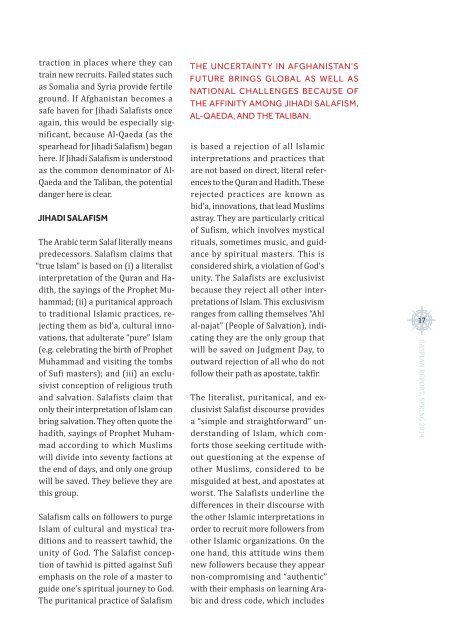Caspian Report - Issue: 07 - Spring 2014
You also want an ePaper? Increase the reach of your titles
YUMPU automatically turns print PDFs into web optimized ePapers that Google loves.
traction in places where they can<br />
train new recruits. Failed states such<br />
as Somalia and Syria provide fertile<br />
ground. If Afghanistan becomes a<br />
safe haven for Jihadi Salafists once<br />
again, this would be especially significant,<br />
because Al-Qaeda (as the<br />
spearhead for Jihadi Salafism) began<br />
here. If Jihadi Salafism is understood<br />
as the common denominator of Al-<br />
Qaeda and the Taliban, the potential<br />
danger here is clear.<br />
Jihadi Salafism<br />
The Arabic term Salaf literally means<br />
predecessors. Salafism claims that<br />
“true Islam” is based on (i) a literalist<br />
interpretation of the Quran and Hadith,<br />
the sayings of the Prophet Muhammad;<br />
(ii) a puritanical approach<br />
to traditional Islamic practices, rejecting<br />
them as bid’a, cultural innovations,<br />
that adulterate “pure” Islam<br />
(e.g. celebrating the birth of Prophet<br />
Muhammad and visiting the tombs<br />
of Sufi masters); and (iii) an exclusivist<br />
conception of religious truth<br />
and salvation. Salafists claim that<br />
only their interpretation of Islam can<br />
bring salvation. They often quote the<br />
hadith, sayings of Prophet Muhammad<br />
according to which Muslims<br />
will divide into seventy factions at<br />
the end of days, and only one group<br />
will be saved. They believe they are<br />
this group.<br />
Salafism calls on followers to purge<br />
Islam of cultural and mystical traditions<br />
and to reassert tawhid, the<br />
unity of God. The Salafist conception<br />
of tawhid is pitted against Sufi<br />
emphasis on the role of a master to<br />
guide one’s spiritual journey to God.<br />
The puritanical practice of Salafism<br />
The uncertainty in Afghanistan’s<br />
future brings global as well as<br />
national challenges because of<br />
the affinity among Jihadi Salafism,<br />
Al-Qaeda, and the Taliban.<br />
is based a rejection of all Islamic<br />
interpretations and practices that<br />
are not based on direct, literal references<br />
to the Quran and Hadith. These<br />
rejected practices are known as<br />
bid’a, innovations, that lead Muslims<br />
astray. They are particularly critical<br />
of Sufism, which involves mystical<br />
rituals, sometimes music, and guidance<br />
by spiritual masters. This is<br />
considered shirk, a violation of God’s<br />
unity. The Salafists are exclusivist<br />
because they reject all other interpretations<br />
of Islam. This exclusivism<br />
ranges from calling themselves “Ahl<br />
al-najat” (People of Salvation), indicating<br />
they are the only group that<br />
will be saved on Judgment Day, to<br />
outward rejection of all who do not<br />
follow their path as apostate, takfir.<br />
The literalist, puritanical, and exclusivist<br />
Salafist discourse provides<br />
a “simple and straightforward” understanding<br />
of Islam, which comforts<br />
those seeking certitude without<br />
questioning at the expense of<br />
other Muslims, considered to be<br />
misguided at best, and apostates at<br />
worst. The Salafists underline the<br />
differences in their discourse with<br />
the other Islamic interpretations in<br />
order to recruit more followers from<br />
other Islamic organizations. On the<br />
one hand, this attitude wins them<br />
new followers because they appear<br />
non-compromising and “authentic”<br />
with their emphasis on learning Arabic<br />
and dress code, which includes<br />
17<br />
CASPIAN REPORT, sprIng <strong>2014</strong>










